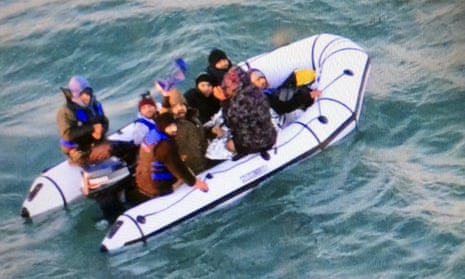Most people were still asleep on Christmas Day when Ameena* landed in England. She remembers stumbling onto the Kent beach in total darkness, retching with sea sickness.
“When I arrived I was vomiting everywhere,” the teenager told the Observer during the first media interview with an unaccompanied child refugee who has entered the UK by boat.
Ameena, 17, made the crossing in a 12ft dinghy with seven other strangers on 25 December 2018. Although the English Channel is the world’s busiest shipping lane, the date meant less maritime traffic than usual while conditions were, for the time of year, only mildly choppy. The Afghan arrived, according to Border Force records, on the broad sloping beach at Folkestone at 2.40am on Christmas Day.
Press reports at the time focused on the fact that a girl – revealed now as Ameena – had made the perilous journey to Folkestone and was among several vessels and 40 migrants who attempted to cross the Channel that day.
Three days after Ameena arrived in Kent the home secretary Sajid Javid cut his family Christmas short and announced a “major incident” to deal with the rising number of migrants attempting to cross the Channel in small boats.
Ameena, who began her overland journey from Tehran, Iran, where she had been surviving as a refugee after fleeing Afghanistan, described the sea crossing from Turkey to Greece as the opposite of the dangerous navigation of the Channel.
“From Turkey the police were escorting us, making sure it was as safe as possible. Crossing to the UK was very, very dangerous by comparison. It was dark and cold and we were alone, I was scared,” she said.
Initially the teenager and the dinghy’s other occupants had no idea where in the UK they had landed. Ameena recalls stumbling around in the dark for hours being sick. “I actually called the police but I couldn’t tell them where I was, I had no idea.” Eventually a passing dog walker at dawn raised the alarm.
After being taken away by officers Ameena never saw her travelling companions again.
The journey from France had begun shortly before midnight on Christmas Eve, their boat heading out from a quiet beach south of Calais, thought to be close to the village of Wissant, Pas-de-Calais.

Ameena’s inflatable boat was powered by an outboard motor with the French-based traffickers directing those on board to head straight for the lights on the horizon.
She said that the crossing took three hours and although the wind was not strong, the swell soon turned her stomach.
The teenager’s mother had paid the smugglers in advance and Ameena never knew the exact fee for the crossing. Migrants have previously disclosed they paid £6,000 for a seat on a dinghy crossing the Channel. Last Monday a French court sentenced an Iranian imam to two years in prison for helping migrants to try to cross the Channel in inflatable boats.
Despite the vast majority of migrants coming from troubled countries such as Afghanistan, Javid has questioned whether those crossing the Channel are “genuine” refugees and has provoked ridicule by calling for patrol vessels to be redeployed from the Mediterranean.
Charities dealing with the arrivals in Kent claim the home secretary’s rhetoric is at odds with the fact that the processing of asylum claims of those arriving by boat are in fact speeding up.
Bridget Chapman of the Kent Refugee Action Network (KRAN), which has supported Ameena since her arrival, said: “The home secretary is also saying that he’s sending people back, choosing to pretend that patrol boats in the channel are there to stop people, but the truth is they are bringing people in.”
Official figures reveal that at least 716 people, including about 70 children, have crossed the Channel in small boats since the start of November 2018. Yet the truth, added Chapman, is that such numbers are dwarfed by the volume of migrants crossing the Channel into the UK from France who are hidden in lorries.
In a teaching class of around 20 unaccompanied minors run by KRAN in Folkestone last Thursday, almost all apart from Ameena and a teenage boy had arrived in the UK in the back of a lorry.
Present were some who arrived as child refugees aged 15 in 2016 and have since made the port town their home.
Among them was Hadi from Afghanistan’s Kapisa province, who hopes to become a construction engineer and who said he had made around 100 attempts to get across the Channel in a lorry before succeeding. “I always made sure I checked that the vehicle number plates said GB because friends have been taken to Sweden or Paris because they had got in trucks heading the wrong way.
“I climbed out near Dartford Bridge, someone must have called the police because they got me soon after and took me to Dover,” said the 17-year-old.
Ameena spent three months in Calais living in cheap accommodation before getting the green light for the Christmas Day crossing.
During the waiting period she was in regular contact with her mother who left Tehran with her but is currently in a migrant detention centre in Athens, an existence that Ameena – not her real name for legal reasons – admits makes her feel “sad”. She said: “The conditions are very bad inside there, I feel for her so much.”
By contrast, the teenager, who speaks impeccable English, says she has made many friends and enjoys life in Folkestone where she lives with a foster family and attends classes run by KRAN.
Ameena turns 18 in August and during the same month plans to move to Canterbury where she will start a course at the city’s college. Smiling wildly and pointing to the sky, she says that her ambition is to become an airline pilot.
“That is my dream and I aim to work as hard as possible to achieve it. I love being up there,” she said, pointing upwards again.
In the meantime she must wait for her asylum claim to be processed at a time when the rate of migrant arrivals by boat appears to have accelerated. More than 70 people were intercepted on 1 June alone after crossing the Channel on eight boats, a development that Javid described as deeply concerning while promising “to do all I can to stop them”.
Activists, however, have called for more help to prevent people from undertaking the journey in the first place.
On Friday a man was charged with people-smuggling after a boat with six people on board, including another child, was picked up off the Kent coast last Saturday after being intercepted by a Border Force vessel. All six said they were Iranian and were taken to Dover where they were handed over to immigration officials.
*Ameena’s name has been changed to protect her identity
